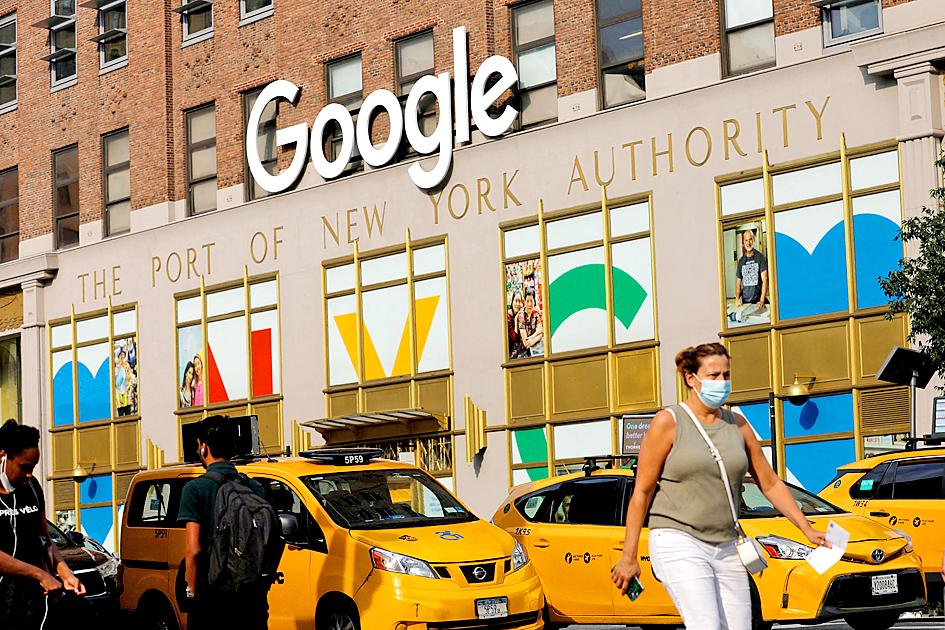Tinder parent Match Group Inc on Monday filed a lawsuit in a federal court in San Francisco accusing Google of abusing monopoly power at its Play Store that sells digital content for Android-powered phones.
The litigation comes as part of an ongoing battle by Match, Epic Games Inc and others to force Google parent Alphabet Inc and iPhone maker Apple Inc to loosen their grips on their respective app stores.
Match’s filing came after Google modified Play Store rules to require its family of apps to use the Internet giant’s payment system, which collects fees of up to 30 percent on transactions, court paperwork said.

Photo: Andrew Kelly, Reuters
Google has made it clear that it will remove Match apps from the Play store if they do not comply with the rule, Match said in the filing, warning that such punishment would be a “death knell.”
“This is a case about the strategic manipulation of markets, broken promises and abuse of power,” Match said in the suit.
Google did not respond to a request for comment, but has previously defended its Play Store fees as in line with industry norms and reasonable for running a secure, global platform for digital content.
DOWNLOAD OPTIONS
While the App Store is the only gateway for content to get onto Apple mobile devices, users of Android-powered smartphones or tablets can download apps at their own risk from online venues other than Google’s Play Store.
Match’s lawsuit contended that despite having options, users get content for Android devices from the Play Store more than 90 percent of the time.
Match called on the court to order Google to let it sidestep the Play Store billing system while keeping its apps on the virtual shelves.
Match is also asking for unspecified monetary damages and legal fees.
Match apps include OkCupid, PlentyofFish and Tinder.
Match, Epic Games and other companies have banded together in the Coalition for App Fairness to lobby for marpetplaces that are just.
Apple has clashed in court with Fortnite creator Epic Games, which has sought to break Apple’s grip on the App Store, accusing the iPhone maker of operating a monopoly in its shop for digital goods or services.
A federal judge in November last year ordered Apple to loosen control of its App Store payment options, but said Epic had failed to prove that antitrust violations had taken place.
APPLE’S STANCE
Apple chief executive officer Tim Cook last month attacked moves to regulate his company’s App Store in a speech in Washington, arguing that new rules could threaten the privacy of iPhone users.
“We are deeply concerned about regulations that would undermine privacy and security in service of some other aim,” Cook told an International Association of Privacy Professionals gathering.

Taiwan Semiconductor Manufacturing Co (TSMC, 台積電) secured a record 70.2 percent share of the global foundry business in the second quarter, up from 67.6 percent the previous quarter, and continued widening its lead over second-placed Samsung Electronics Co, TrendForce Corp (集邦科技) said on Monday. TSMC posted US$30.24 billion in sales in the April-to-June period, up 18.5 percent from the previous quarter, driven by major smartphone customers entering their ramp-up cycle and robust demand for artificial intelligence chips, laptops and PCs, which boosted wafer shipments and average selling prices, TrendForce said in a report. Samsung’s sales also grew in the second quarter, up

On Tuesday, US President Donald Trump weighed in on a pressing national issue: The rebranding of a restaurant chain. Last week, Cracker Barrel, a Tennessee company whose nationwide locations lean heavily on a cozy, old-timey aesthetic — “rocking chairs on the porch, a warm fire in the hearth, peg games on the table” — announced it was updating its logo. Uncle Herschel, the man who once appeared next to the letters with a barrel, was gone. It sparked ire on the right, with Donald Trump Jr leading a charge against the rebranding: “WTF is wrong with Cracker Barrel?!” Later, Trump Sr weighed

LIMITED IMPACT: Investor confidence was likely sustained by its relatively small exposure to the Chinese market, as only less advanced chips are made in Nanjing Taiwan Semiconductor Manufacturing Co (TSMC, 台積電) saw its stock price close steady yesterday in a sign that the loss of the validated end user (VEU) status for its Nanjing, China, fab should have a mild impact on the world’s biggest contract chipmaker financially and technologically. Media reports about the waiver loss sent TSMC down 1.29 percent during the early trading session yesterday, but the stock soon regained strength and ended at NT$1,160, unchanged from Tuesday. Investors’ confidence in TSMC was likely built on its relatively small exposure to the Chinese market, as Chinese customers contributed about 9 percent to TSMC’s revenue last

LOOPHOLES: The move is to end a break that was aiding foreign producers without any similar benefit for US manufacturers, the US Department of Commerce said US President Donald Trump’s administration would make it harder for Samsung Electronics Co and SK Hynix Inc to ship critical equipment to their chipmaking operations in China, dealing a potential blow to the companies’ production in the world’s largest semiconductor market. The US Department of Commerce in a notice published on Friday said that it was revoking waivers for Samsung and SK Hynix to use US technologies in their Chinese operations. The companies had been operating in China under regulations that allow them to import chipmaking equipment without applying for a new license each time. The move would revise what is known